Program Impact
Each year, The Franklin Institute (TFI) partners with an external evaluator to conduct an independent evaluation of the Science in the Summer program's reach, efficacy, and impact on participants. Below are highlights from the 2025 program, Be a Health Scientist!
To read the 2025 GSK Science in the Summer Be a Health Scientist! executive summary, click here.
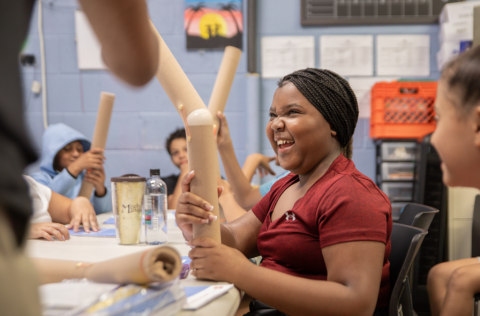
Learners participating in the Be an Athletic Trainer activity via Boys & Girls Club of Philadelphia.
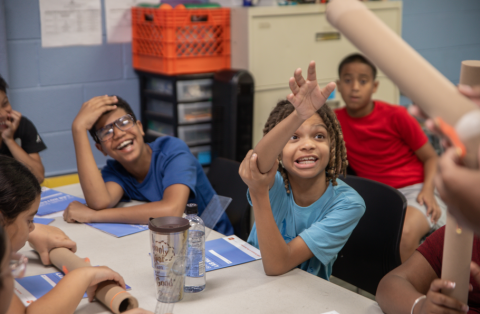
Learners participating in the Be an Athletic Trainer activity via Boys & Girls Club of Philadelphia.
Program Goals For Youth
The goal of Science in the Summer is to increase youth's interest and confidence in doing science and pursuing STEM careers, especially for youth in under-resourced communities.
The program aims to do this by providing opportunities for youth to:
- Embody science careers. Role-play and imagination are important ways that youth practice skills and learn to identify with careers and roles. Science in the Summer activities invite youth to take on the role of different scientists by framing each activity with a storyline that provides real-world context for the phenomena they are investigating through that career.
- Think scientifically. The program’s activities encourage youth to recognize and develop scientific practices such as asking questions, making observations and predictions, and drawing conclusions from evidence.
- Have fun! The program focuses on creating memorable, engaging science experiences rather than acquiring new science knowledge. Creating moments of excitement and connections to youth's everyday experience helps build positive attitudes and confidence in science and STEM careers.
Program Goals For Educators and Informal Institutions
The goal for educators is to build confidence and skills to facilitate high-quality informal STEM experiences for youth.
The goal for informal institutions is to build the capacity to engage youth in under-resourced communities by leveraging and sustaining partnerships with community-based organizations. TFI supports organizations to fold the program into their existing structures.

Maps of the 2025 participating National organizations (left) and Philadelphia-area organizations.
Who participated in the program?
In 2025, a total of 26,612 youth participated in the GSK Science in the Summer program Be a Health Scientist!
Nationally, 24 museums and science centers collaborated with 323 sites to deliver the program to 19,218 youth across the United States.
In the Philadelphia-area, 47 youth-serving organizations located at 186 sites delivered the program to 7,394 youth locally.
A total of 705 educators were trained and delivered the Be a Health Scientist! program. All educators were trained by a staff member at The Franklin Institute or a program lead from their local organization, using training materials created and supplied by TFI.
A total of 4,744 youth in the Philadelphia-area participated in a free field trip to The Franklin Institute as part of the Science in the Summer program.
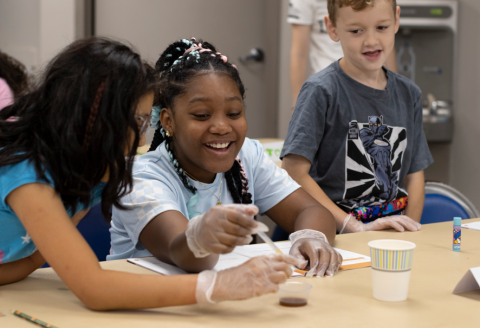
Learners participating in the Be a Dietitian activity via AAAS.
What is Science in the Summer’s impact on YOUTH?
Each summer, learners participate in five hands-on activities built around a different science theme. This theme highlights the career opportunities in this field with the goal of youth seeing themselves as scientists.
93% of educators agreed that the Be a Health Scientist! program helped youth learn more about science.
“Doing these units and being with them sort of at the end of it, that there is a tremendous amount of enthusiasm for the science that wouldn't otherwise be there.”
– 2025 Educator
95% of educators found that the Be a Health Scientist! program increased youth’s confidence and excitement around doing science.
"After each [activity], most students seemed much more confident in their scientific abilities and were more willing to try new activities!"
– 2025 Educator
97% of educators agreed that the Be a Health Scientist! program increased youth’s awareness of science-related careers.
"Many of the children we work with have never considered being a scientist, or even being able to do science. These programs provide them with
opportunities they do not often have. It allows them to gain confidence and more awareness."
– 2025 Educator
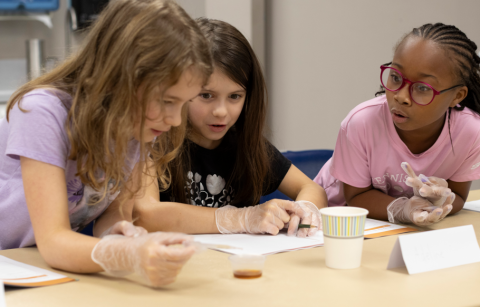
Learners participating in the Be a Dietitian activity via AAAS.
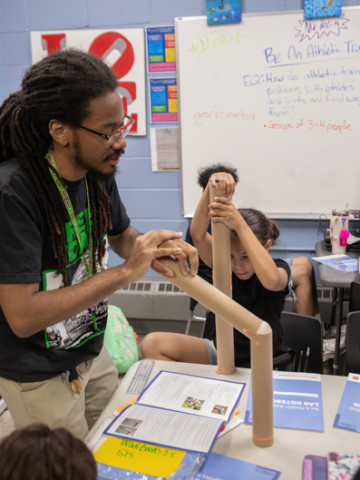
An educator leading the Be an Athletic Trainer activity via Boys & Girls Club of Philadelphia.
What is Science in the Summer’s impact on EDUCATORS?
All educators delivering Science in the Summer programming are trained by The Franklin Institute staff or an organizational coordinator who has been trained by TFI. TFI offers asynchronous, interactive training units that orient the educators to the curriculum as well as facilitation techniques. TFI also hosts in-person hands-on trainings for Philadelphia-area participants. Once trained, educators receive all materials and content needed to deliver the program, as well as on-going support from TFI and their host organization.
91% of educators said they are more comfortable teaching STEM topics after implementing the program.
"This was my best year yet. As my 3rd year teaching Science in the
Summer, and as a non-science educator, I feel more comfortable every
time I teach the program."
– 2025 Educator
79% of educators indicated they are more personally engaged and interested in facilitating STEM topics after implementing the program.
"I'm more at ease with it. I feel much more comfortable. I'm happy to
include at least one STEM activity per each age group. It has just
become a rule of thumb at this point, because it doesn't feel as
overwhelming as it used to."
– 2025 Educator78% of educators said they have increased confidence in encouraging youth to think scientifically. Before the program started, only 54% of educators rated themselves confident in this area.
"[GSK Science in the Summer] was a really great tool for me to be able to
get my team building that pedagogical skillset of like, this is how we
teach engineering. This is how we teach science. This is how we have the
science discussion that we're looking for. We're not sitting here asking
questions to try to get the kids to produce one specific word. We're trying
to have this open discussion, getting the kids to think at a different level
not to, and make connections to their lives and really understand the
science."
– 2025 Educator
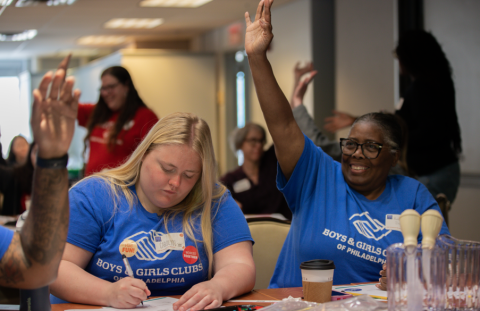
Educators participating in the Be a Health Scientist! training at The Franklin Institute.
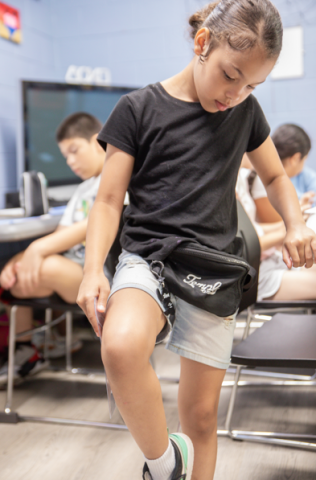
A learner participating in the Be an Athletic Trainer activity via Boys & Girls Club of Philadelphia.
What is Science in the Summer’s impact on participating ORGANIZATIONS?
Science in the Summer participants are part of a network of organizations that receive professional development, training support, and the physical materials to support the program curriculum. Organizations collaborate with local community partners toward the goal of providing equitable STEM experiences in their communities.
- National and Philadelphia-area organizations both noted how the resources The Franklin Institute provides, including the training, materials, and funds, have allowed these organizations to continue to offer and expand the programming.
"It allows the opportunity to work with different organizations that might
not have the funds to bring us in to offer STEAM programming. It allows us
to get more of a statewide presence when we are able to offer it to
different communities throughout the state. So, it definitely helps in the
overall exposure there."
– 2025 Participant
Some organizations noted that they were able to form new partnerships found a lot of value in these relationships.
"[B]ecause it is a program that is free to provide, we have been able to
work with an organization called the [X] Centers. Here in [City], which is
like specific refugee outreach, high Hispanic population in that
community. So just extremely underserved and grateful for the dual lingo
lab notebooks. And you know, so, so those types of partnerships have
definitely grown.– 2025 Participant
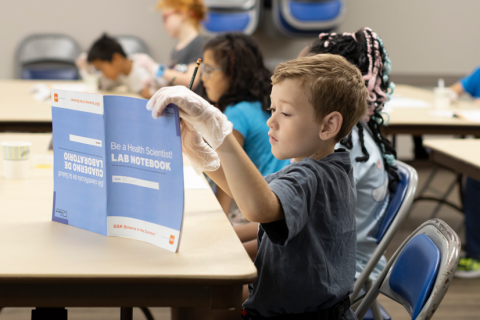
A learner participating in Be a Health Scientist! via AAAS.
To learn more about how your organization can participate in GSK Science in the Summer, visit our National or Philadelphia-area pages.